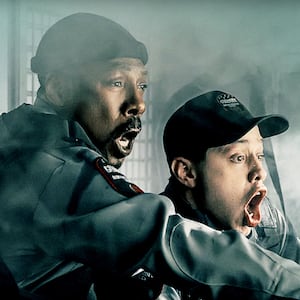Having reconfigured Joel and Ethan Coen’s Fargo into a phenomenal multi-season television hit, Noah Hawley now tackles an even more illustrious classic with Alien: Earth
A prequel to Ridley Scott’s 1979 sci-fi thriller, the series imagines a pre-Nostromo encounter on our planet between a collection of humans (and not-quite-humans) and the deadly H.R. Giger-designed xenomorph.
Reverential in style, tone, and theme to its hallowed ancestor and its follow-ups (in particular, Scott’s 2012 Prometheus and 2017 Alien: Covenant), the eight-part FX series, premiering August 12, is a devoted fan’s dream come true, staying faithful to the franchise’s lore while expanding it in horrifyingly inventive ways—as well as delivering copious gnarliness courtesy of its legendary acid blood-dripping extraterrestrial.
Set in 2120, two years before Scott’s seminal original, Alien: Earth presents a planet divided between, and ruled by, five evil corporations: Weyland-Yutani, Threshold, Dynamic, Lynch, and upstart Prodigy, whose young genius CEO Boy Kavalier (Samuel Blenkin) lords over his urban dominion New Siam. This 22nd-century monarch is a cocky brainiac who longs less for wealth (since he has trillions) than for a conversation with an intellectual equal, and his latest would-be breakthrough is a creation designed to grant mankind immortality.

Whereas cyborgs (cybernetically enhanced humans) and synths (artificially intelligent robots) are the norm, Boy Kavalier has designed a third type of trans-human: synthetic beings downloaded with human consciousness which are known as hybrids. As the initial test subjects for his clandestine trial, he and his chief scientists—husband-and-wife team Arthur (David Rysdahl) and Dame Silvia (Essie Davis)—select kids with fatal conditions, and the first to undergo the procedure is Marcy, whose mind is transferred to a more adult body, after which she’s rechristened Wendy (Sydney Chandler).
That name stems from Boy Kavalier’s Peter Pan fixation: his island research facility is dubbed “Neverland,” he projects the Disney film in the operating room, he reads JM Barrie’s book in ominous story time sessions, and he names his subsequent guinea pigs Slightly (Adarsh Gourav), Tootles (Kit Young), Smee (Jonathan Ajayi), Curly (Erana James), and Nibs (Lily Newmark).
They’re the children who’ll never grow up, and through them and their experiences as pioneering eternals, Alien: Earth embraces the franchise’s diverse and twisted ideas about family, motherhood, birth, sex, identity, and the relationship between the organic and the inorganic. Top to bottom, Hawley knows his Alien stuff, and he warps these familiar undercurrents in intriguingly novel fashion, all as he lays the groundwork for a domestic confrontation with the ferocious title character.
The Alien arrives in our world via the USCSS Maginot, an aptly named craft considering that its attempts to safeguard (and protect humanity from) its cargo prove woefully insufficient. The deep-space research vessel is headed home when some of its heretofore-unknown specimens get loose, thereby providing Hawley with an introductory opportunity to harken back to Scott’s film.

Whether it’s the Maginot looking like the spitting image of the Nostromo (right down to operating system Mother’s control room), the make-up of the ragtag crew of pilots, doctors, and engineers, or the dreamy transitional fades, the opener is a worshipful throwback. Destined to be fleshed out in a later episode, it culminates with chief security officer cyborg Morrow (an intimidating, soulful Babou Ceesay) crashing the ship into New Siam, in the process sacrificing the crew but preserving the specimens that are the prime priority of Yutani (Sandra Yi Sencindiver).
To cope with this calamity in the heart of his city, Boy Kavalier sends Wendy and his “Lost Boys” to check out the site. During this expedition, Wendy searches for her army medic brother Joe (Alex Lawther), on whom she’s fixated, much to the interest of Boy Kavalier and his white-haired right-hand synth Kirsh, played with eerie unemotional iciness by Timothy Olyphant.
Kirsh is a kindred spirit to Michael Fassbender’s ruthless Prometheus and Alien: Covenant robot David, and his clandestine machinations are one of many elements that Alien: Earth juggles with suspenseful poise.

Hawley stages regular scenes of gory madness with the xenomorph and, also, a sterling new alien called “The Eye” because, well, it looks like an eye (decorated with multiple little eyes) on octopus tentacles, and it likes to possess living beings by burrowing into their orbital sockets. This highly intelligent nemesis is front and center throughout the first season, and it adds an extra layer of menace to the action, which eventually segues to Neverland so the insanity can play out in relative seclusion, Jurassic Park-style.
Corporate espionage runs rampant in Alien: Earth, be it Boy Kavalier and Yutani sparring over rights to the xenomorph or Morrow, on behalf of the latter, trying to convince one of the Lost Boys to turn traitor. Hawley ensnares everyone in a web of distrust, duplicity, and deranged scheming, even as he pivots the proceedings around Wendy, whose struggle to reconcile her humanity with her inhumanity—a process complicated by her bond with Joe, her fearsome physical abilities, and her growing detachment—makes her a fascinating female heroine cut from a different cloth than Sigourney Weaver’s Ellen Ripley.
Chandler’s wide-eyed and composed performance expresses the show’s central conflicts between thought and emotion, biology and technology, and childhood and adulthood, and it grows deeper as the material tangles her (and her cohorts) up in constricting knots.
From mist, shadows, strobe lights, and dangling chains to hubristic villains who prioritize profit over safety and common sense, all the old hallmarks are present in Alien: Earth. Still, Hawley’s tale resonates not as a rehash (like Fede Alvarez’s solid if unadventurous Alien: Romulus) but as a unique chapter in the expansive saga.

Cannily adding new wrinkles to his established template without violating canonical rules and timelines, the writer/director nimbly orchestrates his malevolence, whose energy is at once sneaky, sinister, and heavy-metal hellish (epitomized by great episode-closing needle drops from Black Sabbath, Tool, and Metallica). Moreover, he makes sure that everything revolves around the xenomorph and his equally unholy alien pals, from creepy crawly bugs and tentacled flora to The Eye, whose eventual occupancy in a sheep is the stuff of nightmares.
With Alien: Earth, Hawley re-establishes himself as TV’s great cine-remixer, adept at honoring his big-screen favorites by taking their stories in unlikely and exhilarating directions. Amalgamating the best of the franchise’s numerous installments, it’s so good that its monstrous mayhem—whether taking place in the cosmos aboard enormous, rusty crafts or on terra firma in cold research labs—belongs in theaters alongside its illustrious brethren.









